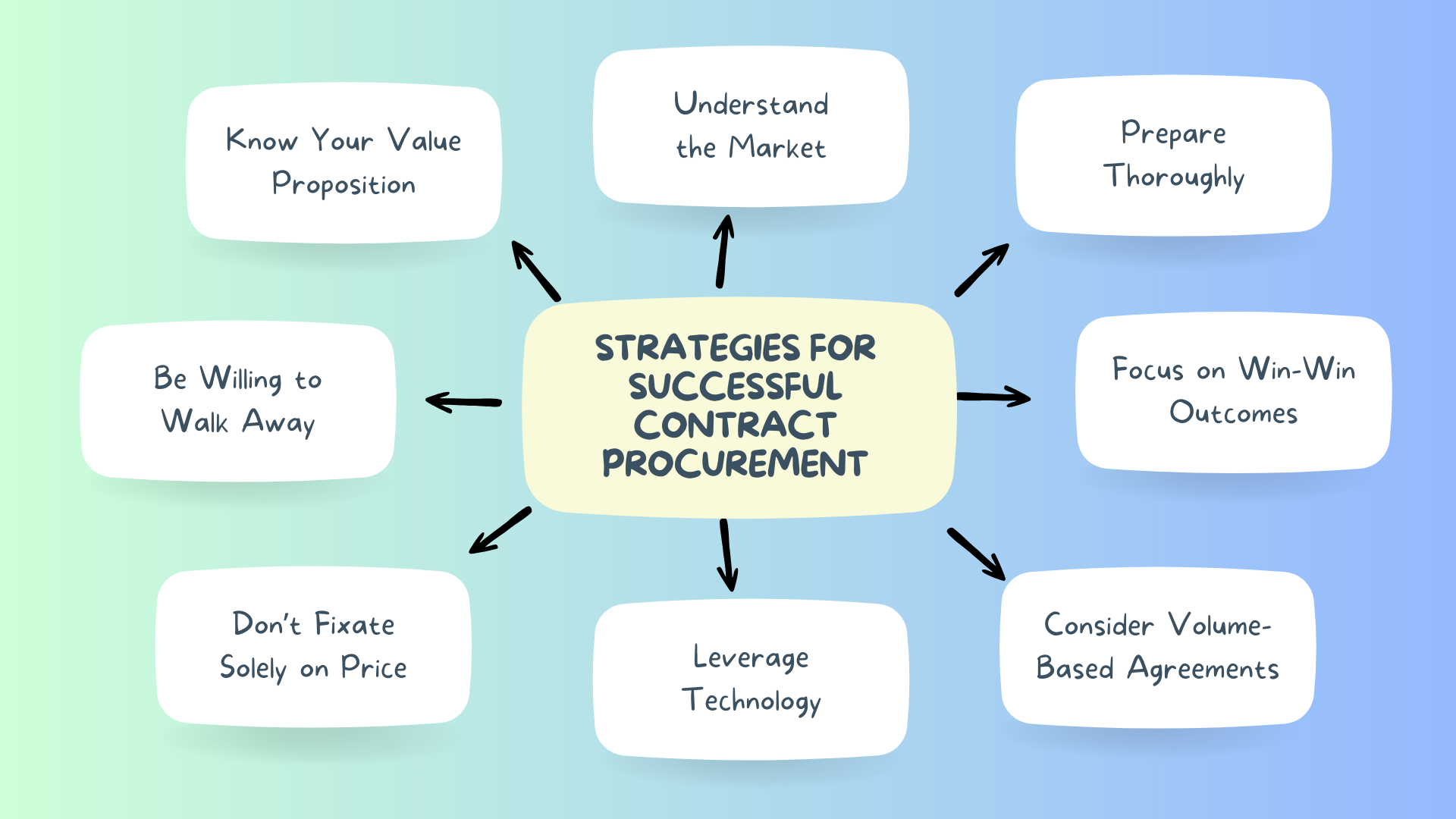- August 12, 2024
- Posted by: admin
- Categories: DME business operations, DME contract negotiation, Negotiation tactics for DME

In the competitive landscape of Durable Medical Equipment (DME) provision, effective contract procurement and negotiation can make the difference between thriving and merely surviving. This blog post explores the significant benefits of mastering these skills and how DME providers can leverage them to enhance their business operations and bottom line.
Understanding Contract Procurement in the DME Industry
Contract procurement in the DME sector involves the process of obtaining agreements with various entities, including:
1. Insurance companies and managed care organizations
2. Medicare and Medicaid
3. Hospitals and healthcare systems
4. Group purchasing organizations (GPOs)
5. Equipment manufacturers and suppliers
Effective procurement ensures that DME providers can offer a wide range of products and services while maintaining profitable operations.
Key Benefits of Effective Contract Negotiation
1. Improved Reimbursement Rates
Skillful negotiation can lead to more favorable reimbursement rates, directly impacting your bottom line.
2. Expanded Service Offerings
Well-negotiated contracts can allow you to broaden your product and service range, attracting more customers and referrals.
3. Enhanced Competitive Position
Securing advantageous contracts can give you an edge over competitors, potentially becoming a preferred provider for certain insurers or healthcare systems.
4. Reduced Operational Costs
Negotiating better terms with suppliers and manufacturers can lower your operational costs, improving overall profitability.
5. Improved Cash Flow
Favorable payment terms and timelines in your contracts can significantly improve your cash flow management.
6. Risk Mitigation
Well-crafted contracts can include clauses that protect your business from potential liabilities and unforeseen circumstances.
7. Strengthened Relationships
The negotiation process, when done right, can foster stronger, more collaborative relationships with payers and partners.
Essential Strategies for Successful Contract Procurement
1. Know Your Value Proposition: Clearly articulate what sets your DME business apart from competitors.
2. Understand the Market: Stay informed about industry trends, reimbursement rates, and competitor offerings.
3. Prepare Thoroughly: Gather data on your performance, patient satisfaction rates, and operational efficiency to support your position.
4. Focus on Win-Win Outcomes: Aim for agreements that benefit both parties to ensure long-term, sustainable relationships.
5. Consider Volume-Based Agreements: Negotiate better terms in exchange for guaranteed volume, where appropriate.
6. Leverage Technology: Use contract management software to track terms, deadlines, and performance metrics.
7. Don’t Fixate Solely on Price: Consider other valuable terms like exclusivity, marketing support, or faster payment cycles.
8. Be Willing to Walk Away: Know your bottom line and be prepared to look for alternatives if terms aren’t favorable.
Overcoming Common Challenges in DME Contract Negotiation
1. Rapidly Changing Regulations: Stay informed about healthcare laws and regulations that may impact contract terms.
2. Complex Reimbursement Models: Understand various reimbursement models and their implications on your business.
3. Balancing Quality and Cost: Negotiate terms that allow you to maintain high-quality standards while remaining profitable.
4. Managing Multiple Contracts: Implement systems to effectively manage and track numerous contracts simultaneously.
5. Addressing Power Imbalances: Develop strategies to negotiate effectively with larger entities that may have more bargaining power.
How WWS Enhances Contract Procurement and Negotiation for DME Providers
At WWS, we understand the critical role that effective contract procurement and negotiation play in the success of DME providers. Our comprehensive support includes:
Market Intelligence: We provide up-to-date information on industry trends, standard rates, and best practices to inform your negotiation strategy.
Contract Analysis: Our team of experts reviews your existing and proposed contracts, identifying areas for improvement and potential risks.
Negotiation Support: We offer guidance and even direct representation in negotiations, leveraging our industry expertise to secure favorable terms.
Technology Solutions: Our contract management platform, including the upcoming AI-driven X-Propeller, helps you track, analyze, and optimize your contracts.
Compliance Assurance: We ensure that all negotiated terms comply with relevant healthcare regulations and standards.
Performance Tracking: Our analytics tools help you monitor contract performance, providing data to support future negotiations.
Training and Education: We offer programs to enhance your team’s contract procurement and negotiation skills.
By partnering with WWS, you gain a powerful ally in contract procurement and negotiation. Our expertise and technology solutions empower you to secure agreements that drive your business forward, allowing you to focus on what you do best – providing excellent care and service to your patients.
Remember, in the DME industry, your success is often determined by the contracts you secure and how well you negotiate them. With the right strategies and support, contract procurement and negotiation can become a significant driver of your business growth and success.
References and Further Reading:
1. American Association for Homecare – Payer Relations: https://www.aahomecare.org/payer-relations
